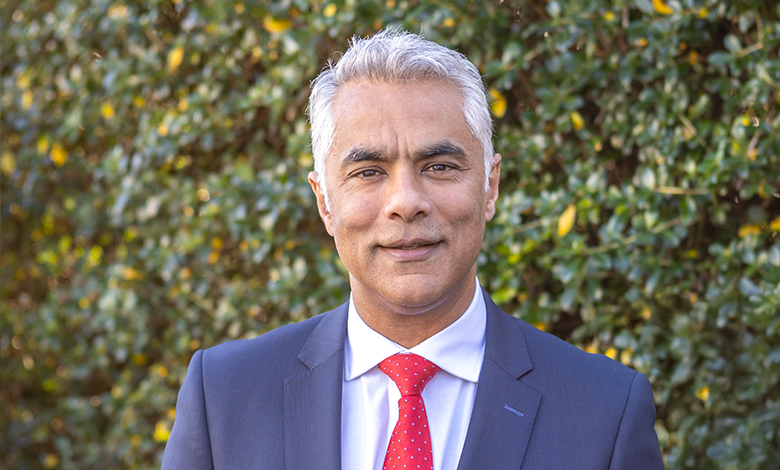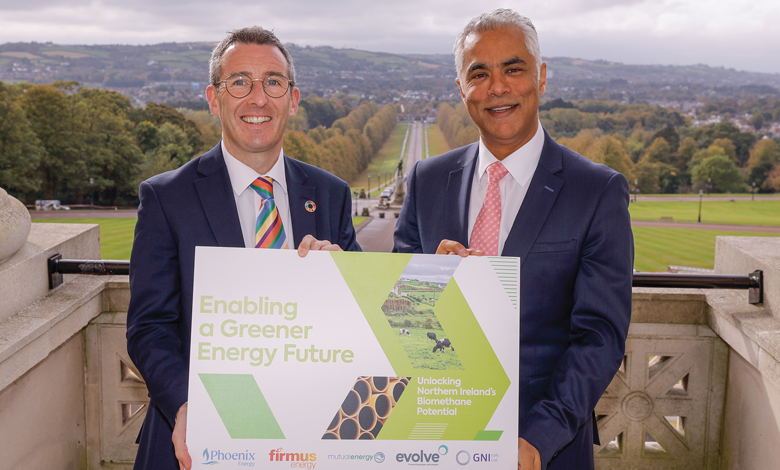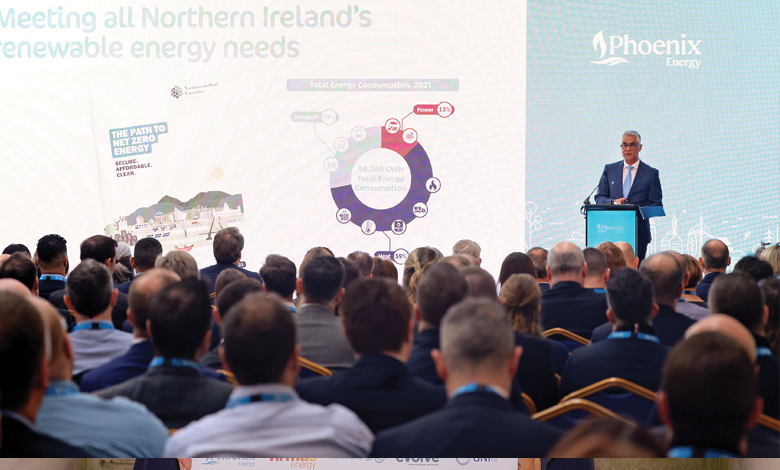Fuelling the future

One year on from the launch of a series of gas industry 2030 commitments, Kailash Chada, Group CEO of Phoenix Energy, talks to David Whelan about significant progress and outlines the need for a supportive policy framework to capitalise on the potential of biomethane.
In April 2024, Hong Kong-based CK Infrastructure Holdings Limited (CKI) completed one of the largest takeovers in Northern Ireland’s history when it purchased Phoenix, the region’s largest natural gas distributor, an asset base worth a reported £760 million. Completed just a few months after the rebrand of Phoenix Natural Gas to Phoenix Energy – aimed at better reflecting the company’s overarching plan to transition to renewable gas solutions – Chada attests that it has been a busy 18 months.
In 2023, Phoenix joined with the region’s other gas network operators in committing to the full decarbonisation of the regional gas network – outlining five near-term commitments to support the sustainable introduction of renewable gases in Northern Ireland. Chada explains that the takeover has served as a further vote of confidence that Phoenix is on the right path.
“The takeover is a massive endorsement of our work to date and our vision for the future,” explains the Group CEO, who outlines that CKI’s long-term holding of other gas distribution businesses such as Northern Gas Networks, Wales & West Utilities, and Australian Gas Networks Limited is evidence of the longevity and stability afforded by such ownership.
“Our new owners have fully assessed and are entirely supportive of our renewable gas pathway. There is a recognition of the long-term future for gas distribution networks in the overall push for net zero, which is a massive endorsement of Phoenix, of the gas industry and also of Northern Ireland as an investment destination.
“The other major benefit is that we at Phoenix are able to tap into and lean on a huge family of infrastructure business experience.”
Having built the gas industry in Northern Ireland from scratch just over 25 years ago, Phoenix owns and operates the relatively new gas distribution network in the Greater Belfast, Larne, east Down and Whitehead areas. In 2023, Phoenix connected its 250,000th property to its gas network and boasts over 4,000km of gas network pipelines, making natural gas available to over 350,000 homes and businesses.

“We need to make sure that there is a proportionate level of focus and resource applied to decarbonising our thermal heating loads, that will in turn provide a much more resilient and increasingly integrated future energy system.”
Significant progress for the Northern Ireland gas industry over the past year includes a £12.7 million investment in new connections, totalling 10,000 new customers, supporting the reduction of up to 20,000 tonnes of carbon.
Net zero
Whilst Phoenix’s vision is to move away from the distribution of fossil fuels to support the Northern Ireland Executive’s net zero by 2050 vision, Chada makes it clear that reaching this ambition is a transition rather than overnight change. Key to this transition will be ensuring as many homes and businesses as possible are connected to the existing gas network.
Conversion of a home from an oil boiler to gas grid connection results in up to 50 per cent reduction in carbon emissions per year, which the CEO equates to a household’s car not being driven for a year and a half, and importantly, offers a pathway to a future seamless transition to net zero gas.
“Not only does connection to the existing gas grid present an immediate carbon reduction from the burning of oil, but also represents a connection to a network that sits ready to distribute renewable gas, with little disruption to the consumer,” says Chada.
Challenged on whether greater levels of electrification could negate the need for a gas network in the future, Chada says: “The reality is that net zero is going to require multiple solutions working in tandem. Currently, electricity accounts for just 13 per cent of Northern Ireland’s energy needs and around half (7 per cent) is renewable. Once we deliver the the 80 per cent by 2030 target, that moves us to 11 per cent of our total energy need being renewable because almost 60 per cent of regional energy volumes consumed are for heating demands in our domestic, industrial, and commercial sectors.
“Therefore, we need to make sure that there is a proportionate level of focus and resource applied to decarbonising our thermal heating loads, that will in turn provide a much more resilient and increasingly integrated future energy system.”

Biomethane
Over 550,000 homes and businesses in Northern Ireland have access to the gas network and critical to meeting the thermal heating needs of the region is the development of a regional biomethane economy.
In 2022, research carried out by the Centre for Advanced Sustainable Energy (CASE) and Queen’s University Belfast indicated that Northern Ireland has significantly greater volumes of renewable gas availability than previously thought, serving as a springboard for industry collaboration on the development of a biomethane economy.
Findings that some 845,000 tonnes of CO2 could be saved in the production of over 6,000 GWh worth of renewable gas from the feedstocks of livestock manure and underutilised silage alone were significant, as was the realisation that this could meet more than 90 per cent of Northern Ireland’s gas distribution network demand.
In November 2023, the first successful direct-to-grid biomethane injection took place at the Granville site near Dungannon, confirming the readiness of regulatory and technical frameworks required to facilitate the injection, while also proving that the acceleration of biomethane in Northern Ireland would not require radical new steps by policymakers.
More recently, in March 2024, a request for information issued through a collaboration of Northern Ireland’s gas network operators received submissions from 86 projects, capturing 3.6 TWh per year of potential production and highlighting just how considerable the potential for a biomethane economy in the near term is, if the right supporting policy frameworks are established.
Stressing the urgency required in developing a biomethane policy framework for Northern Ireland, Chada says: “There is a significant risk that without quick mobilisation, Northern Ireland – which had enjoyed the successful development of an anaerobic digestion sector up until around 2017 – falls behind other countries, not only leaving it uncompetitive in the agricultural and industrials sectors, but without access to a required decarbonisation pathway for the Northern Ireland gas industry’s 2030 targets.”
Biomethane Pathfinder Proposal
In October 2024, Phoenix, alongside Action Renewables and other industry partners, issued a position paper calling on the Northern Ireland Executive to support a number of local near-term ‘pathfinder’ projects, which they believe “can build on current market momentum” while longer-term policy and support mechanisms are developed by the Executive departments.
Calling for capital support in the region of £30 million to support the production of circa 120 GWh of annual biomethane production, the Group CEO says: “The benefits of biomethane are now widely accepted and therefore the debate has moved beyond whether a biomethane sector is desirable or required and is now focused on how it should be implemented and supported.”
Highlighting the closure of the Department for the Economy’s (DfE) Biomethane Call for Evidence in August 2024, and ambition that a biomethane action plan will be developed soon, Chada states: “At this stage of biomethane policy development, pathfinder projects could provide a range of beneficial outcomes and ensure the successful implementation of Executive polices.”
Chada is resolute in his belief that developing a biomethane economy is not only critical to ensuring a net zero gas network, but also to build on the wider environmental and economic opportunities presented by successful deployment, particularly across our rural economy.
“Northern Ireland boasts a globally-leading reputation as a region of 1.9 million people who provide enough food for 10 million people. However, while we excel in our agriculture and food production, there is an acknowledgment that our productivity in this area means increased levels of waste management. The increased profile of the deterioration of some of our loughs and rivers has further reinforced the impact that high levels of waste alongside other regional factors is having on our ecosystem.
“Through the establishment of a high performing biomethane economy, we have an opportunity to utilise that waste and to support the Executive’s ambitions for a circular economy, to mitigate some of the environmental challenges, to decarbonise the gas supply of the whole region, and to generate economic growth through investment, increased employment, and skills development.”
“We will all have to play our part to deliver the solutions needed in a way that is affordable and accessible to the consumer.”
Hybrid heating systems
In anticipation of greater levels of biomethane injected into the gas network, and not wanting to rest on their laurels, Chada explains that Phoenix is also working to deliver consumer-focused solutions to support the decarbonisation of heat across the region.
Almost 60 per cent of Northern Ireland’s dwellings have an Energy Performance Certificate (EPC) rating of D or below, and the sector accounts for around 14 per cent of total greenhouse gas emissions.
Whilst there are a range of technologies that can support a householder’s transition to low carbon heating, a key challenge will continue to be the practicalities and cost effectiveness of solutions, particularly in the retrofit scenarios. It is for this reason that Phoenix, in collaboration with installation company Refresh NI, has rolled out a hybrid heating trial which Chada believes could present a significant solution to the retrofit challenge.
The integration of a heat pump with a traditional gas boiler, Chada explains, sees the gas boiler work as a background provider of peak energy demand at times when the heat pump needs support.
“The benefits to both individual householders and our regional energy system are considerable and very much support an increasingly integrated future energy system that provides a reliable, affordable end user solution.”
Whilst hybrid technology is already well established across Europe, Phoenix has four hybrid heat pump trials currently underway and is progressing a number of additional trial projects with the Northern Ireland Housing Executive, Northern Ireland’s largest landlord, due to be installed at the start of 2025.
“We are also engaging with the Utility Regulator and the Department for the Economy about a much larger trial in 2025 where we would install hybrid heat pumps across a broad range of property types,” Chada explains.
Future planning
Returning again to the need for urgency, Chada points to the unique opportunity Northern Ireland has to decarbonise its heat use and build upon the supportive policy, regulatory, and industry momentum that has been established in the last couple of years. Pointing to recent progress in the Republic of Ireland where the publication of a National Biomethane Strategy in May 2024 has seen the Republic set out a very clear biomethane pathway, he believes that local policymakers must now take a similar approach to start unlocking Northern Ireland’s considerable potential.
Added to his call to support the pathfinder project, he views the introduction of a Renewable Heat Obligation (RHO) and defined targets as potential “gamechangers” in market activation for Northern Ireland’s regional biomethane economy.
This, he states, is supported by industries across Northern Ireland who themselves have an obligation to decarbonise and have identified renewable gas as key to meeting supply chain sustainability requirements.
Stressing the importance of collaboration across the energy sector, he says: “Recent years have seen a noticeable shift whereby there is now much broader recognition that no single/individual solution will deliver our net zero targets. As CEO of Phoenix, I meet regularly not only with key stakeholders in the gas industry, but also with my counterparts in the utility sectors such as electricity and water because we will all have to play our part to deliver the solutions needed in a way that is affordable and accessible to the consumer.”
Asked to define progress in the coming year, Chada concludes that clear policy, setting out the regional ambition and aspiration for a biomethane economy, would serve to underpin the work already done by Phoenix and its counterparts in the delivery of decarbonisation solutions.
“The reality is that the potential exists, and there is a lot of investment out there waiting to land. If we fail to act quickly, that investment will find another home and we will miss the opportunity to drive forward on our decarbonisation journey, and the economic and environmental opportunities that presents.”





